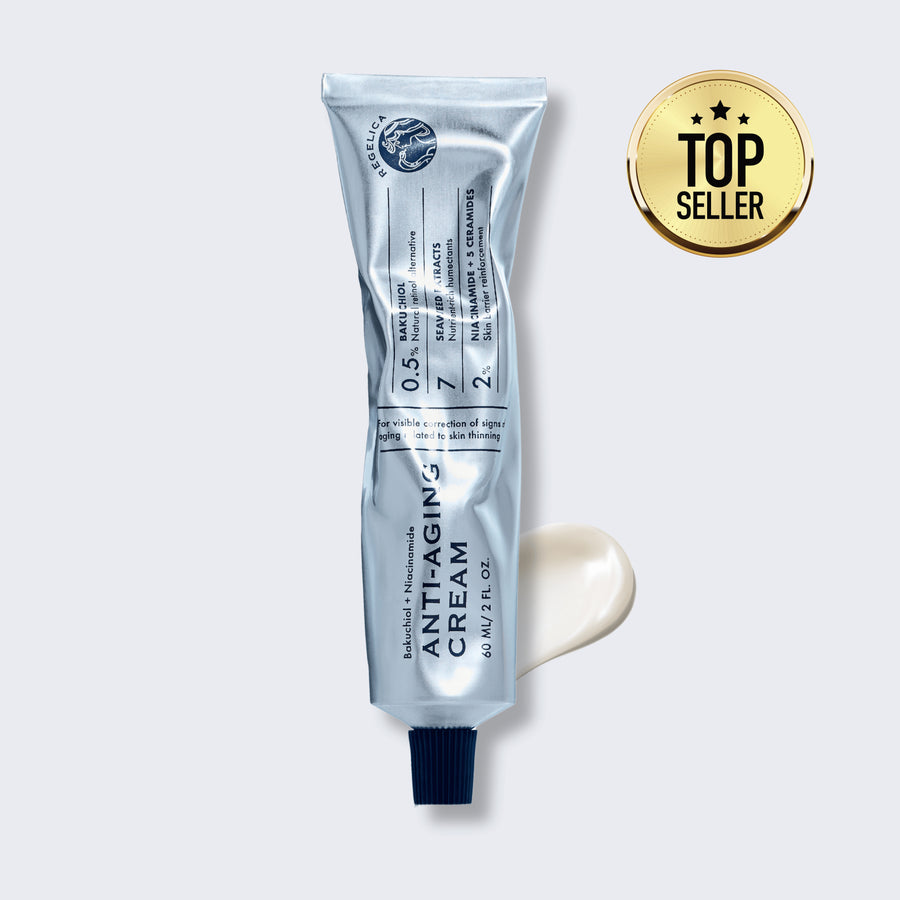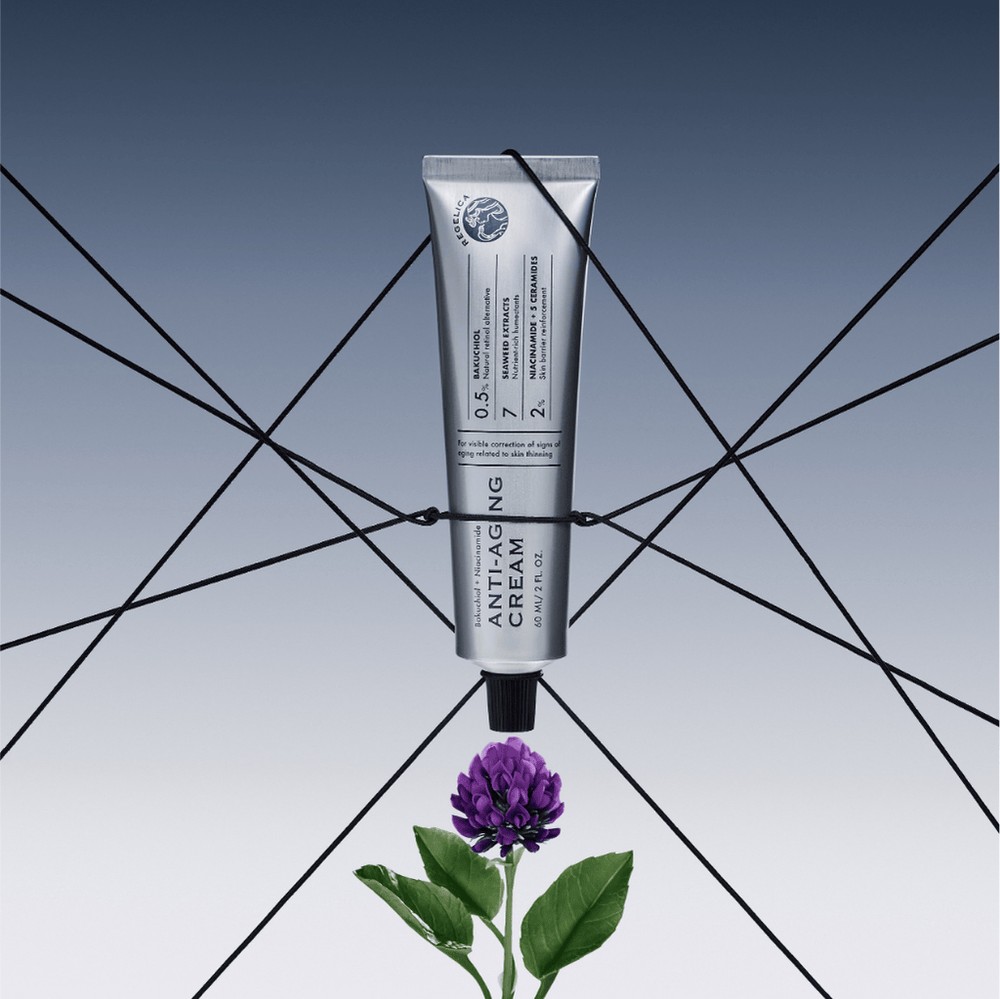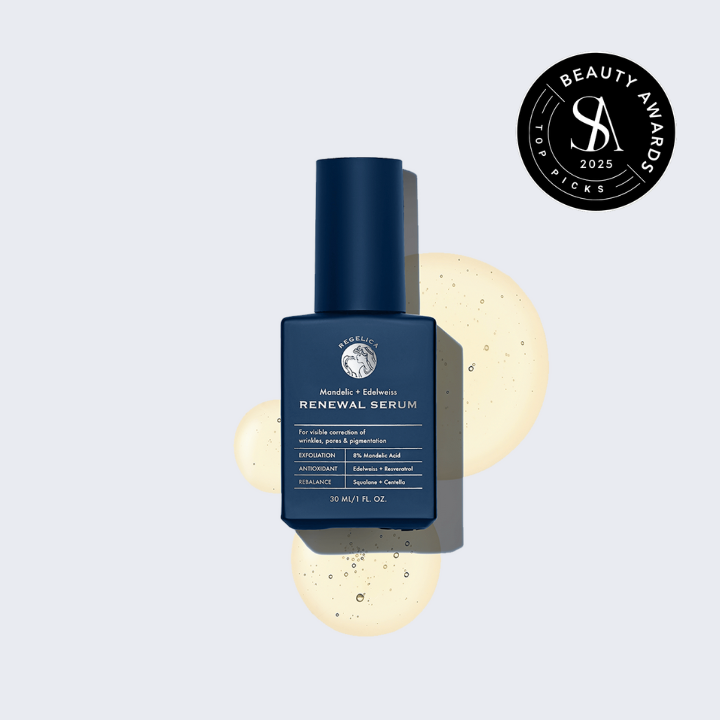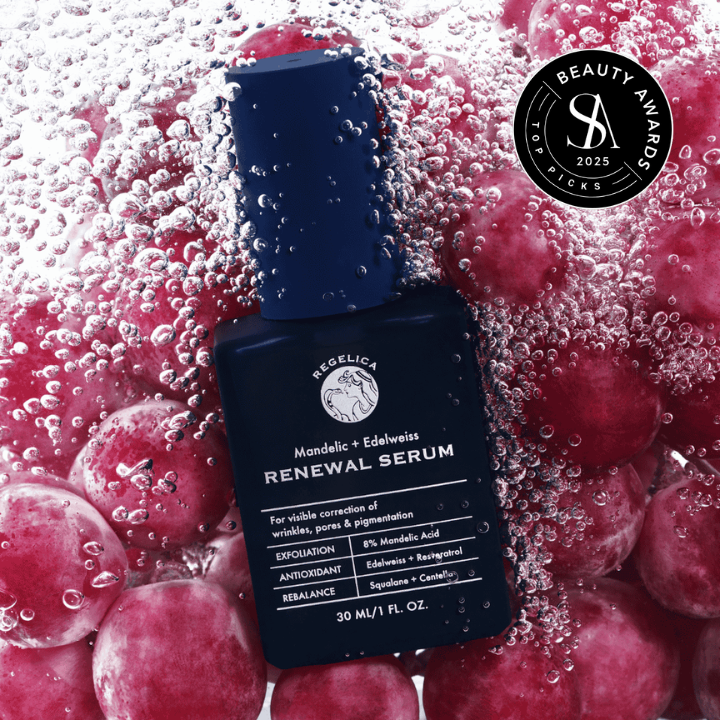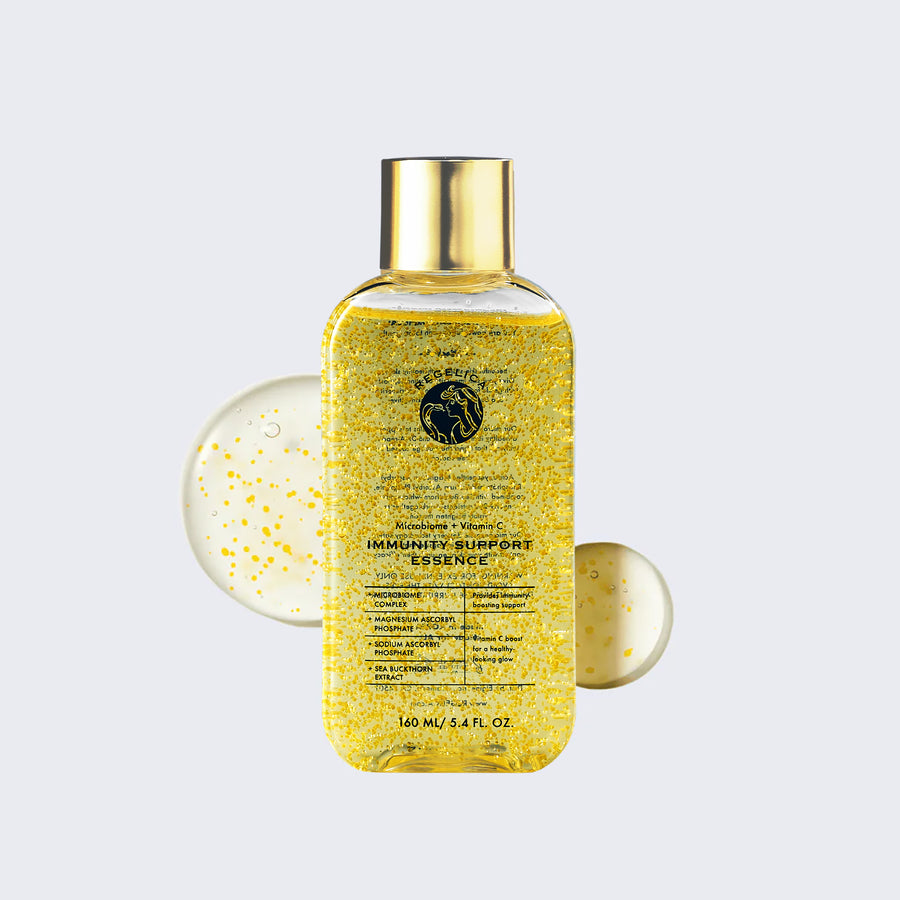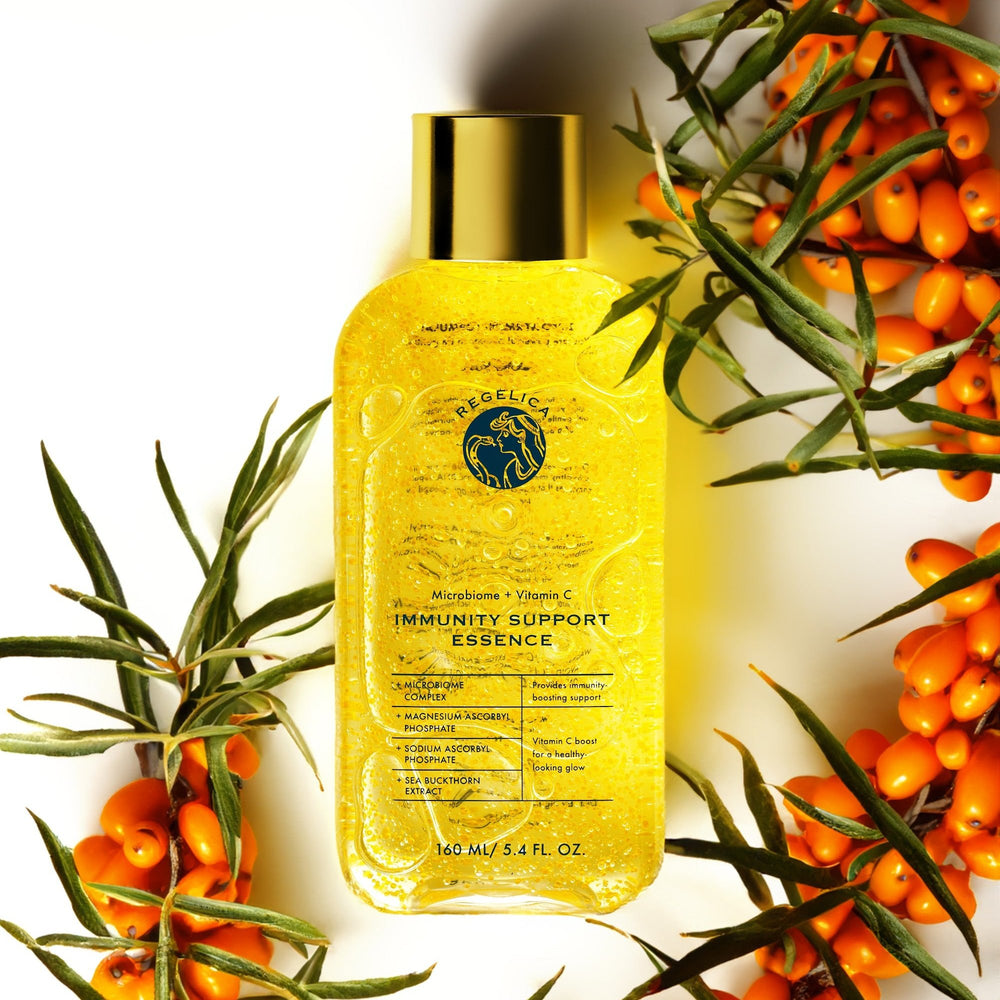Potent Anti-Aging Skincare for Sensitive Skin
Most dermatologists agree that those with sensitive skin should keep their skincare minimalistic, avoiding over-exfoliation and active anti-aging products. And it’s true: strong AHAs, retinoids, vitamin C, and high fragrance formulas can irritate your skin and may even result in dermatitis. The only option left for people with sensitive skin is simple moisturizers, without even a hint of active anti-aging ingredients.
Collagen production reduces by 1% each year, a fact that often makes people with sensitive skin anxious, as they can’t do much to fight against aging. This is not true. Here are some anti-aging skincare alternatives for sensitive skin.

Image: irritation on sensitive skin after retinol treatment
1. A Retinol alternative for sensitive skin
Vitamin A derivatives, such as Retin-A and Retinol, are the most researched and recommended anti-aging skincare ingredients. They are proved to increase collagen production and cell turnover and reduce wrinkles and hyper pigmentation. However, many people experience redness, dryness, or flakiness while using products with this ingredient.
Recent studies have shown that naturally derived bakuchiol causes similar changes in gene expression as retinol, responsible for collagen production and skin thickness. Clinical studies comparing bakuchiol to retinol showed that both ingredients resulted in similar improvement in fine lines, wrinkles, hyperpigmentation, and skin firmness. However, bakuchiol users experienced less irritation.
This finding is great news for people with sensitive skin. Now, they can include a powerful collagen-stimulating ingredient that has been proven to be less sensitizing than retinol. Another positive is that bakuchiol is not photosensitizing, so it can be used, not just at night, but all day long for powerful anti-aging support.
2. A Vitamin C alternative for sensitive skin
Ascorbic acid is the most researched form of vitamin C, consistently proven to be the most effective at penetrating the skin barrier and providing numerous benefits, including protection from UV photo-damage, increased collagen production, and reduced hyperpigmentation. However, since it requires an extremely low pH, it can be very irritating to people with sensitive skin.
There are other antioxidants that feature many of the same benefits as vitamin C but offer a gentler touch.
· Niacinamide protects against free radicals, brightens skin, reduces enlarged pores, and boosts skin barrier function.
· Resveratrol improves the look of fine lines, hyperpigmentation, and texture, tackles acne, and lightens dark spots and post-acne scarring.
· Edelweiss extract has twice the power of vitamin C and helps lift the skin, reinforce the skin barrier, and smooth the appearance of wrinkles.
· Centella asiatica is famous for its soothing and moisture-boosting properties.
· Turmeric helps calm the skin and counteract pollution and environmental damage.
· Stable forms of vitamin C, such as 3-O Ethyl Ascorbic Acid, need to be converted to Vitamin C within the skin. Since it’s a slower process, this form of vitamin C is much more tolerable.
· Sea buckthorn is a powerhouse for a strong immune system, with more than 190 micro-elements, including vitamin C, as well as vitamins A, B1, B2, and B6.
3. Sunscreen for sensitive skin
Sunscreen is arguably the most important step in your anti-aging routine. Studies show that 80% of the signs of visible aging comes from the sun.
There are 2 types of sunscreens: physical (mineral) and chemical. Mineral sunscreen serves as a physical shield between the skin and the sun’s harmful rays. It consists of zinc oxide and titanium dioxide that prevent UV rays from penetrating the skin. On the other hand, chemical sunscreen lets the UV light penetrate the skin where a chemical reaction converts UV light into heat that dissipates from the skin. This can cause irritation and allergic reactions.
Therefore, people with sensitive skin are recommended to look for zinc oxide or titanium dioxide on the label.
4. Glycolic acid alternatives for sensitive skin
Glycolic acid is the most popular alpha-hydroxy acid (AHA) and has an array of anti-aging benefits. It exfoliates dead skin cells, evening skin texture and fading dark spots. It also helps stimulate collagen and improve the thickness of the skin. It has the smallest molecular structure among AHAs, making it the most effective in penetrating the skin, which also makes it the most irritating.
On the other side of the AHA spectrum, Mandelic acid has the largest molecular structure. According to skincare chemist, Myeongdeok Seo, “It doesn’t penetrate skin as deeply as glycolic acid and is less irritating to the skin.”
Polyhydroxy acids, or PHAs, which are even larger, work exclusively on the surface, without penetrating the deeper delicate layers of the skin.
5. Cleansing of sensitive skin.
Cleansing is one of the most important steps in the skincare routine. It helps remove all those nasty pollutants and toxins from the outside world, as well as makeup, sunscreens, and dead skin cells. A good cleansing allows for topical products to work more efficiently.
However, this step can also be traumatic knowing harsh cleansers can cause an imbalance in our skin's pH level, stripping away natural oils and beneficial bacteria, and disrupting its acid mantle. This leads to increased sensitivity as well as reduced effectiveness when protecting microflora.
Water Lily pH-Balanced Gentle Cleanser provides everything you need while maintaining your skin's natural pH balance through plant-derived cleansing agents free of sulfates (SLS).

How to build an anti-aging routine for sensitive skin
Whatever anti-aging active you are looking to incorporate into your skincare, remember the quote from the alchemist Paracelsus: “All substances are poisons; there is none that is not a poison. The right dose differentiates a poison from a remedy.” Let your skin get accustomed to anti-aging actives. It’s a marathon, not a sprint. Start using them once a week and build your way to using them every day.
Why is my skin so sensitive?
Understanding the reason behind your skin sensitivity is another crucial factor in building a successful anti-aging regimen for your skin. Very often it is related to extreme dehydration and the skin immunity function. Make sure that the serums and moisturizers you use are balanced with both humectants (for example, glycerin, propylene glycol, and seaweed extracts) that attract water and emollients (for example, squalene and cholesterol) to create a layer that traps moisture. Without emollients to seal the moisture, it can evaporate and leave your skin drier than before.
The skin barrier consists of dead skin cells that are linked by the lipid matrix, comprised of cholesterol, fatty acid and ceramides. Mimicking these ingredients in your moisturizer will help reinforce the skin barrier function and balance out collagen-stimulating and exfoliating actives.
Skincare science has evolved. At Regelica, we believe that you don’t need to compromise your skin barrier to get anti-aging results. We leverage innovations in botanical research to replace irritating ingredients with alternatives that are effective and gentle to your skin.
Bakuchiol + Niacinamide Anti-Aging Cream contains a potent 0.5% concentration of Bakuchiol that has shown to be just as effective as retinol in stimulating collagen production but with less irritation and no photosensitivity.
Mandelic + Edelweiss renewal Serum uses the gentlest AHA at 8% concentration that works synergistically with Edelweiss extract that is more powerful and more tolerable than vitamin C.
We are also working on a gentle cleanser in which drying SLS and sulfates will be replaced by coconut-derived cleansing agents that remove all impurities without stripping your skin of natural oils and damaging the microbiome.




